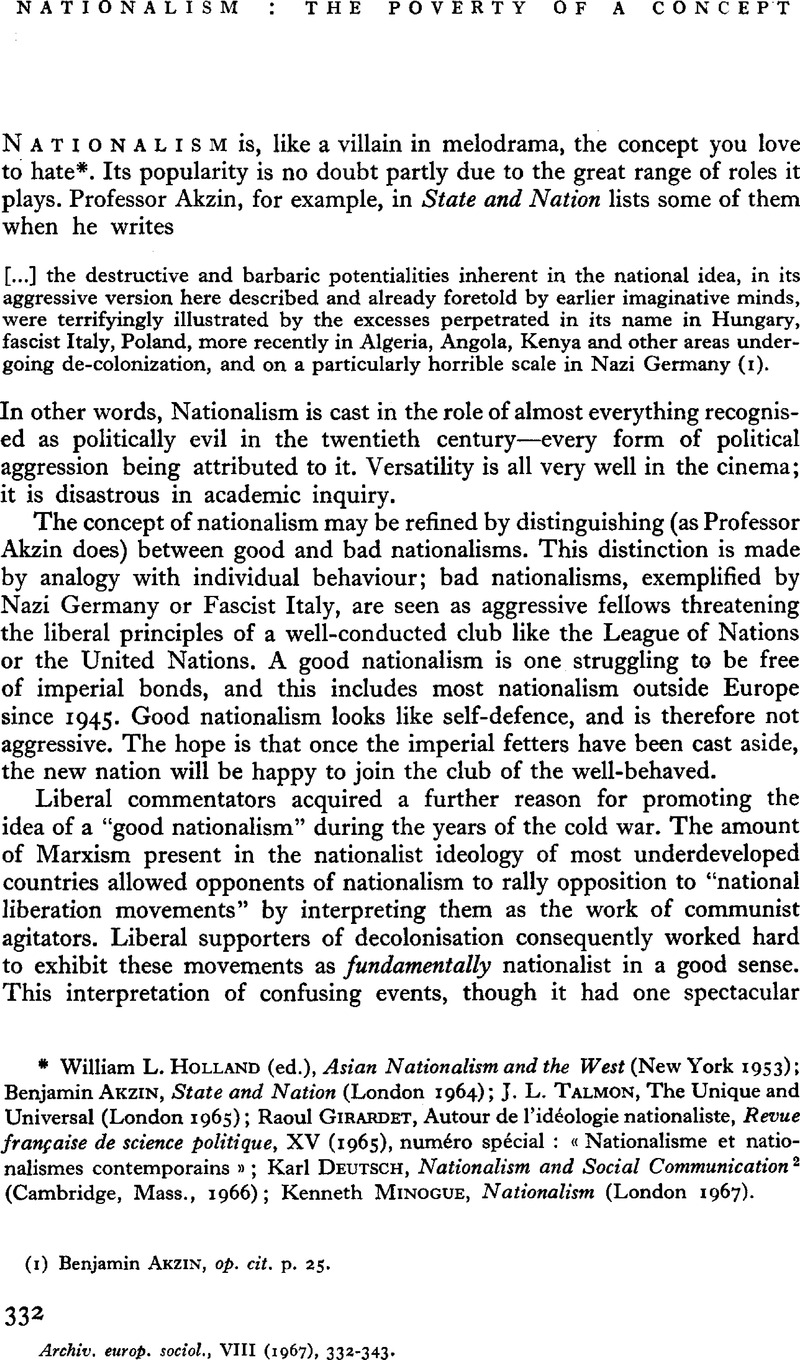Article contents
Nationalism: the Poverty of a Concept
Published online by Cambridge University Press: 28 July 2009
Abstract

- Type
- Notes Critiques
- Information
- European Journal of Sociology / Archives Européennes de Sociologie , Volume 8 , Issue 2 , November 1967 , pp. 332 - 344
- Copyright
- Copyright © Archives Européenes de Sociology 1967
References
* Holland, William L. (ed.), Asian Nationalism and the West (New York 1953)Google Scholar; Akzin, Benjamin, State and Nation (London 1964)Google Scholar; Talmon, J. L., The Unique and Universal (London 1965)Google Scholar; Girardet, Raoul, Autour de l'idéologie nationaliste, Revue française de science politique, XV (1965)Google Scholar, numéro spécial: « Nationalisme et nationalismes contemporains »; Deutsch, Karl, Nationalism and Social Communication (Cambridge, Mass., 1966)Google Scholar; Minogue, Kenneth, Nationalism (London 1967).Google Scholar
(1) Akzin, Benjamin, op. cit. p. 25.Google Scholar
(2) Indeed, even those hapless commentators who diagnosed the Chinese Communists as merely “agrarian reformers” and who were so soundly discomforted after 1948 may be said to have come into their own since the split between Russia and China. In a sense, they had been right—but only partially, and only in the long term, And so far as politics is concerned, in the long run we are all right.
(3) Holland, William L., op. cit. p. 3.Google Scholar
(4) Deutsch, Karl, op. cit. p. 6.Google Scholar
(5) Talmon, J. L., op. cit. p. 16.Google Scholar
(6) Girardet, Raoul, loc. cit.Google Scholar
(7) Girardet, , loc. cit., p. 439.Google Scholar
(8) Ibid.
(9) I have discussed this connection in: Minogue, Kenneth, op. cit. ch. II.Google Scholar
(10) Kedourie, Elie, Nationalism (London, Hutchinson, 1960), p. 1.Google Scholar
(11) Unless, perhaps, one refers back to the tribal ferocities of the ancient world; nationalism has at times been taken as a new tribalism.
(12) Quoted in Sydenham, M. J., The French Revolution (London, 1965), p. 205.Google Scholar
(13) Gellner, Ernest, Thought and Change (London 1964), p. 170.Google Scholar
(14) Stern, Fritz, The Politics of Cultural Despair (Berkeley 1961), p. 87.Google Scholar
(15) In Chapter I of Nationalism (Minogue, K., op. cit.)Google Scholar I have argued the same point, citing as examples the careers of Clemenceau, Maurras, Hitler and Michael Collins. One cause of this alienation of the nationalist leader from his people is the fact that Nationalism was largely created by exiles—either men literally spending time abroad, or else feeling that they had no proper place in the community as it existed, Nationalism is typically an ideology of a small and isolated intelligentsia living in the midst of a primitive population.
(16) Time, 12 30th 1966.Google Scholar
- 1
- Cited by


